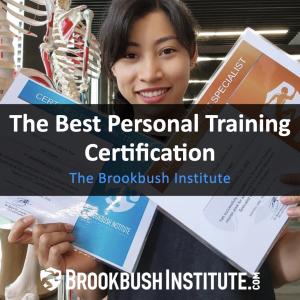In a new article, the Brookbush Institute considers a “wish list” of attributes the best possible Certified Personal Trainer (CPT) certification should have.
— Dr. Brent Brookbush, CEO of Brookbush Institute
NEW YORK, NEW YORK, UNITED STATES, May 4, 2023/EINPresswire.com/ — The Best Personal Training Certification?
There are so many problems with the personal training certifications on the market – from high prices, to poorly taught (or boring) exercise science courses, mis-leading and/or incorrect information, completion dependent on large inflexible time commitments, formats that prevent learning on the go (e.g. giant textbooks), hidden fees (e.g. additional costs for practice exams), post-purchase costs (e.g. certification exam retake fees), paying again for redundant material labeled as advanced credentials (e.g. specialty certifications), being expected to keep records and save certificates for recertification, poorly designed and hard to navigate websites, etc… All of this must make fitness professionals feel like they are trying to choose the right personal trainer certification by selecting the least bad option. Note, this is not an exhaustive list of issues with personal training certifications, nor does it apply to only a couple of fitness certifications… These are just some of the issues that are the standard offering of most personal training certifications (and specialty certifications) in the fitness industry (e.g. NASM, ISSA, ACE, NSCA, ACSM, etc.).
We know our colleagues in the fitness industry are just looking for affordable, evidence-based, practical personal training education they can use with clients tomorrow. Studying for the certification should be easily accessible, flexible, and convenient enough to fit into anyone’s busy work/life schedule. Ideally, the information would be delivered in a way that made studying maximally effective and enjoyable, with unparalleled care to optimize study materials and certification exams.
Summary of Needed Innovations
– $450.00 – $2000.00 for a Personal Training Certification is CRAZY: Initial investment in a certified personal trainer certification (CPT) should be low to reduce the barriers of entry for a more socioeconomically diverse population, and initial investment and return policies should allow students the chance to review materials with little or no financial risk. The overall price should be affordable to promote re-investment in the lifelong learning of exercise science, and the acquisition of additional credentials.
– No Hidden Fees: Hidden fees have to go! You can find out more about the fees that a variety of certification programs are hiding by checking out – How Much Does a Personal Training Certification Cost (Including Hidden Fees)?
– Stop with the Double, Triple, or Quadruple Billing: Repackaging the same content with a different label has to stop. Too many continuing education courses, additional certifications, and advanced credentials are built on information that was already purchased as part of a primary credential (usually a Certified Personal Trainer (CPT) Certification. Billing a premium rate for redundant information with a coveted label is just unethical behavior.
– Convenient, Accessible, and Flexible: Move over Amazon.com, move over Netflix.com… you want it easy, affordable, enjoyable, and in the palm of your hand, look to personal training certifications for none-of-that. The world has changed and certification programs need to catch up. Education should be easily accessible via desktop (laptop) or mobile device (phone), easy to start and stop, and consumable in smaller chunks.
– Accredited/Peer-reviewed: To ensure minimum standards of education quality, personal training certification providers should complete 3rd party, systematic and objective peer-review by subject matter experts, under the supervision of a national council developed for competency assurance (comprehensive peer-review). Unfortunately, this is not the standard in the industry. While this is part of the stringent requirements necessary to pass learning review and approval by the American Council on Education (ACE), it is not part of the most popular accreditation, the National Commission for Certifying Agencies (NCCA). For more on this topic, check out – What is a Fully Accredited Personal Trainer Certification?
– Employment Opportunities: Having “CPT” (Certified Personal Trainer) after your name should increase the chance of, or provide opportunities for employment. A few organizations actively seek partnerships to help the professionals they certify attain interviews. The Brookbush Institute has established relationships with Lifetime, Goodlife, Equinox, NYSC, and US Fitness, just to name a few.
– It Must be Evidenced-based (Accurate): Too many certifications base their content on the thoughts of one or a few individuals (high potential for bias), make half-hearted attempts at citing their work (cherry-picked citations), or their content is woefully out-of-date and far from comprehensive. Evidence-based practice is the only way to RELIABLY achieve the HIGHEST levels of content accuracy.
– It Has to be Practical: Having a strong scientific foundation is important for any scientific profession, but personal training certifications need to focus on the scientific information that correlates with being a better personal trainer. Several certifications on the market do a good job at making you smarter, but the number of exercises, exercise progressions/regressions, routines, and programming examples in the majority of certifications is embarrassingly small.
– Student-centered Learning: It is crazy to charge someone a fortune, to force them to learn from a poorly written text, only have that one learning format
available, and give them zero choices over the subjects they want to learn, to prepare for a ridiculous summative exam. Education research opposes these practices. Educators should work to remove as many obstacles as possible from the learning experience, ideally using advanced instructional design and technology, to integrate choice, multiple learning formats, iterative testing, etc., to provide a far more effective and enjoyable education experience.
– End Summative Final Exams: Enough with the fear-inducing, cram-and-forget inspiring, single-shot to pass-or-fail, final exams. We have to end summative final exams and replace them with iterative testing and benchmarks based on progress through coursework. We must find ways to assess ability while motivating students to learn more.
– Re-certification Requirements: In theory, re-certification is a wonderful idea, to ensure professionals continue their education. In practice, re-certification has become a clumsy, cumbersome, rubber stamp on pretty horrible course offerings, after payment of an unapologetic money grab. Recertification should be iterative, automatic, and affordable.
Read the full article: The Best Personal Training Certification?
Brent Brookbush
Brookbush Institute
+1 201-870-0718
[email protected]
Visit us on social media:
Facebook
Twitter
LinkedIn
Instagram
YouTube
TikTok
![]()
Originally published at https://www.einpresswire.com/article/631674571/disrupting-how-certified-personal-trainers-cpts-are-getting-certified




